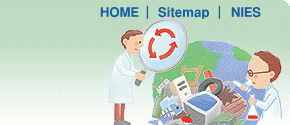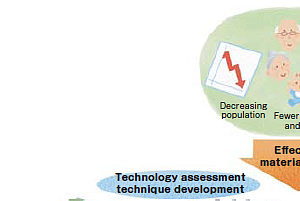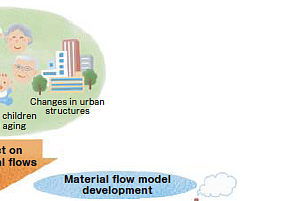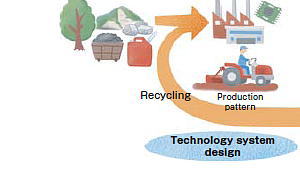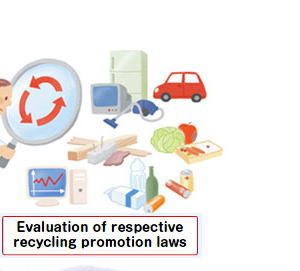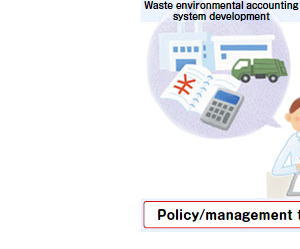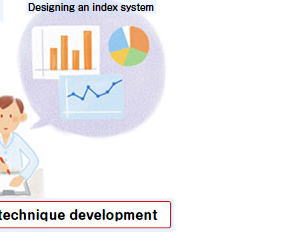A future vision and associated conversion scenarios and specific road maps to realize the transformation into a sound material-cycle
society are needed at various administrative unit levels such as national and local level as well as at various subject levels such as citizens,
administrative authorities and industry.
For this reason, this research project envisages technology and socio-economic systems in
a sound material-cycle society 10-20 years in the future and promotes research activity with the objective of providing conversion scenarios
and specific road maps based on strategically determined targets.
This research project comprises three subthemes.

With the anticipated industrial structure, population pyramid, changes in people's lifestyles, and trends in policies relating to
energy, industry, medical services and waste in the near future taken into consideration, we will develop a material flow model to express the
effect of these social factors on material flows. Using this model, we will project and evaluate resource utilization and waste generation
anticipated in the near future and determine strategic targets for the transformation into a sound material-cycle society. Using this model,
etc., we will estimate and evaluate the effect of shifting to technology systems and policies in the near-future visions and associated
conversion scenarios designed under other sub-themes. Through such processes, we may show the feasibility of achieving targets
and anticipated problems in each conversion scenario and produce the outputs that indicate the directions of policies to be taken for
progress toward near-future visions.

We will design and evaluate material cycle technology systems sized to different spatial scales to cover biomass and depleting metal
resources, which are expected to become an issue in the near future. We will employ life cycle assessment (LCA), life cycle cost analysis
(LCC), and other assessment techniques to evaluate environmental loads and cost. In the meantime, we will review 3R technologies for
plastics used in packaging and containers, home electric appliances and various information apparatus, which are subject to review under
the respective recycling promotion laws. Through this activity, we are planning to propose near-future material cycle technology system visions.

With the ideas of a sound material-cycle society and the established objectives taken into consideration, we will design, develop
and assess the validity of policy/management techniques concerning 3Rs. More specifically, we will design an index system and develop
environmental accounting techniques in waste management to facilitate the national and local governments to measure progress made in the
transformation into a sound material-cycle society, formulate material cycle- and waste management- related plans and implement
their management practices. Further, we will evaluate the effect and validity of respective recycling promotion laws from such viewpoints
as the optimization of material flows, extended producer responsibility (EPR), burden sharing, the provision of economic incentives and
comparison with other systems for further integration of material cycle and waste management policies. Through this activity, we
believe that we will be able to contribute to the national government's next basic plan for establishment of a sound material-cycle society,
the formulation of material-cycle and waste management plans by local governments, and the indication of a direction for desirable
waste management- and recycling-related law systems.

